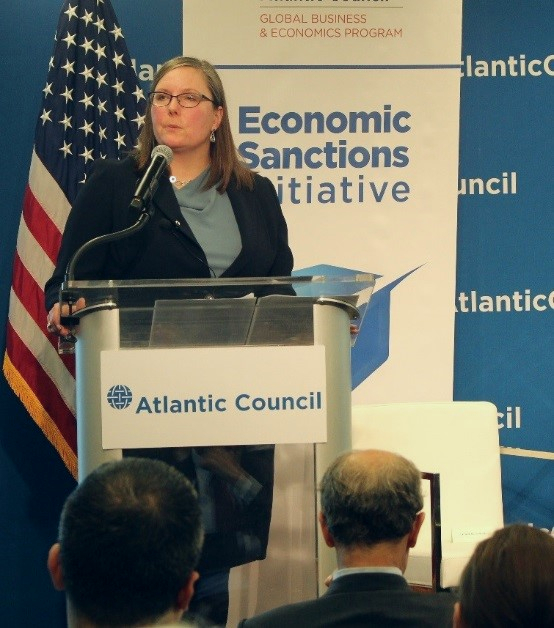
On Tuesday, February 26, the Atlantic Council’s Global Business & Economics Program’s Economic Sanctions Initiative hosted a public discussion featuring Ms. Andrea Gacki, Director of the US Treasury Department’s Office of Foreign Assets Control (OFAC), on the Global Magnitsky Act’s uses, misuses, and lessons for business.
Ms. Gacki was introduced by Ambassador Daniel Fried, a distinguished fellow at the Atlantic Council’s Future Europe Initiative and Eurasia Center. Ms. Gacki described OFAC’s increasing role in targeting corruption and human rights abusers all over the world as a result of the Global Magnitsky Act. She outlined OFAC’s current activities and strategy to maximize the impact of economic sanctions with a particular focus on cooperation with allies.
You can watch a video of the discussion here.
Ms. Gacki described OFAC’s increasing role in targeting corruption, human rights abuses and violations all over the world as a result of the Global Magnitsky Act. She described OFAC’s current activities and strategy of maximizing the impact of economic sanctions while minimizing unintended consequences and disruptions for third parties. She stressed close cooperation with allies and partners as essential to conduct effective policy.
Ms. Gacki was introduced by Ambassador Daniel Fried, distinguished fellow at the Atlantic Council’s Future Europe Initiative and Eurasia Center. Ms. Gacki’s remarks were followed by a high-level panel discussion moderated by Ms. Samantha Sultoon, visiting senior fellow at the Global Business & Economics Program and Scowcroft Center for Strategy and Security. Panelists included Stephen Pomper, US Program Director at the International Crisis Group; Clay Porter, Managing Director at Navigant; and Gerald Regan, First Secretary for Sanctions at the British Embassy to the United States. The discussion touched on a variety of issues, including the relation of sanctions with broader foreign policy strategy and goals, the increasing cooperation of OFAC with non-governmental organizations (NGOs) and how private firms can incorporate sanctions-related reputational risks into their business strategies.